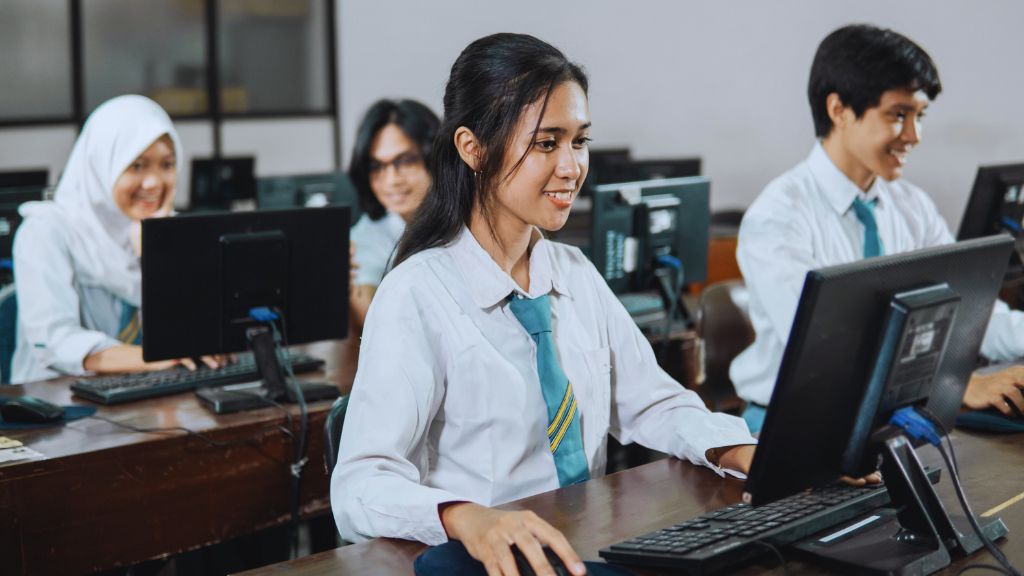How Indonesia is tackling the challenges of AI learning in the classroom
By Yuniar A.
In a recent panel discussion, Indonesian education and tech leaders shared how to overcome the challenges of implementing artificial intelligence (AI) in the classroom.

The Indonesian Ministry of Education will implement AI learning for primary and secondary school students starting in the 2025-2026 academic year. Image: Canva
The education system in Indonesia is aligning with global trends by integrating artificial intelligence (AI) into the national curriculum.
From the next academic year 2025-2026, Indonesian primary and secondary schools would start rolling out AI and coding as elective subjects for students.
The Indonesian Minister of Primary and Secondary Education Regulation is currently being drafted.
"By mastering these skills, students are expected to not only be able to face the ongoing industrial revolution but also be ready to become Indonesia's future technology leaders," said Indonesian Ministry of Primary and Secondary Education’s Director of Secondary Education, Winner Jihad Akbar.
According to him, students would spend two hours of class time per week in fifth-grade primary school and junior high school, and up to five hours of class time in high school.
For grades 11–12 in high school/vocational school, the learning is optional with a maximum allocation of four class hours.
Akbar was speaking on a panel titled Empowering Schools to Bring AI and Coding Learning to the Classroom at the Centre for Indonesian Policy Studies’ (CIPS) Digiweek 2025 event in Jakarta recently.
Other speakers were Guru Belajar Foundation’s Chairman, Maman Basyaiban; Microsoft Indonesia’s AI National Skills Director, Arief Latu Suseno; and Canva Indonesia's Education Lead, Pipit Indrawati.
The implementation of AI in Indonesian schools is guided by global frameworks such as the UNESCO ICT Competency Framework for Teachers (2018), UNESCO K-12 AI Curricula (2022), and AI Competency Framework for Students (2024).
Akbar said that this learning does not solely focus on the technical aspects of programming, but also will help develop computational thinking skills, systematic problem solving, and algorithmic logic.
To subscribe to the GovInsider bulletin, click here.
A flexible approach, tailored to the local context
The panel speakers emphasised that the AI learning process must remain inclusive and not the only way to hone students' computational thinking skills.
Akbar added that the ministry has adopted a flexible and contextual implementation strategy to address the challenges.
Schools with existing infrastructure, like multimedia labs or reliable internet, can use tablets and laptops for interactive learning.
For schools with limited access, the government will provide satellite internet.
"We are also preparing an alternative solution in the form of an ‘unplugged’ curriculum, which is a learning approach without digital devices in the form of educational games such as Lego to hone students’ computational thinking," he explained.
This solution would provide autonomy for schools to determine learning strategies and methods that are suitable for local conditions.
Ensuring the community stays focused on the goal
Guru Belajar Foundation’s Basyaiban, highlighted that a significant challenge of incorporating AI in learning is ensuring that teachers and students do not become "trapped by the tools" but instead focus on the "thinking process".
He shared a reflective story from his time as a student when he learned to use Flash and HTML applications, those tools were no longer in use a few years later,
"How to develop computational thinking skills is the most important thing. This is what will be used when times and tools change," said Basyaiban.
Another challenge is teachers’ preparedness and the disparity in tech skills between teachers and students.
In many cases, teachers feel that their students are more proficient in using technology. This creates a unique dynamic where teachers are no longer the sole source of knowledge, but facilitators of an evolving learning process.
According to him, one thing often overlooked in educational policy design is the need for teachers to learn in a manner similar to students.
"If we want teachers to adapt their teaching methods to students, then we must also adapt how we support teachers," he added.
Partnering tech providers
All the speakers agreed that educational transformation cannot be done alone. Partnering the private sector was necessary to improve learning capacity as a collective investment for the future.
Microsoft’s Suseno stated that his company is partnering with the Indonesian government through an AI programme for education.
The programme included introducing secondary school students to the Python programming language and introducing primary school students to AI literacy and data security.
Microsoft has introduced AI coding training through Minecraft Education Edition (MEE). This initiative has allowed teachers and students to grasp AI concepts via educational games, aiming to make learning both interactive and relevant.
Canva’s Indrawati, echoed Basyaiban's view on the role of educators in AI learning. She emphasised the crucial need to empower teachers as the primary facilitators of introducing AI to students.
Recently, Canva launched a new feature, Canva Code, to support teachers in creating creative and interactive learning experiences.
"Canva also provides training for the teacher community, which now has 100,000 members, through roadshows and webinars with on-demand topics," she added.